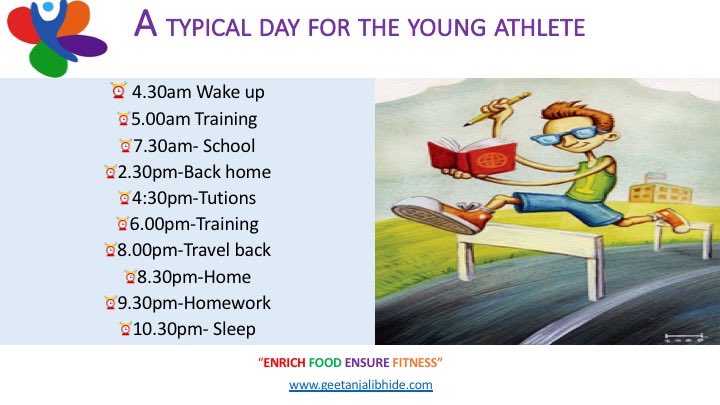The young athlete is the phase of rapid growth, maturation, metabolic and hormonal changes. Good nutrition is critical to sustain physical activity, support growth, recover and excel in sports
Nutritional challenges and concerns of the young athlete
A quick peek into the daily routine of a young athlete makes you realize it’s not an easy task. The child or adolescent athlete begins a day with intense sports training, hops to school, runs to a coaching class, evening training and returns home exhausted to finish his homework. The young Indian athlete is expected to excel in sport and do reasonably well in academics. To endure this stressful routine- good nutrition is crucial. The young athlete- child and adolescent is in a phase of rapid growth, maturation, metabolic and hormonal changes, alterations in body composition and weight. This is also a period of social, emotional and mental development. Good nutrition is crucial to sustain physical activity, support growth, recovery and excel in sports. However, meeting the optimal nutritional needs could be a task.
Challenges, Concerns and Consequences
In this phase of stress and storm- the young athlete has many challenges that are cause for concern-
1. Poor dietary intake: Nutrient requirements of the adolescent athletes are reasonably high to support training and growth. Athletes skip meals due to busy training and academic schedules. Food available at training area is in appropriate. Many athletes end up eating street foods since limited food choices are available. The stress of competition or over training lowers appetite. 2. Hydration: Child and adolescent athletes produce more metabolic heat; core temperature rises rapidly and they are likely to sweat less. Less fluid intake aggravates chances of dehydration. 3. Weight cycling:Weight class sport athletes attempt to lose weight or body fat closer to competition. Weight loss is achieved either by fasting, minimal food and fluid intake and drastic measures like excessive exercise, use of laxatives, vomiting, use of sauna and steam baths. 4. Body Image:Many Indian adolescents desire to have a physique akin to their favourite film personalities. Undue concern about one’s body image is a psychological problem and can cause eating disorders in adolescents. 5. Eating disorders: Anorexia nervosa (fear of gaining weight, starvation and excessive weight loss). Bulimia nervosa (binging and purging) are seen in athletes from aesthetic and weight class sports. 6. Excessive training: Overtraining to achieve the desired physique can lead to low energy and consequently nutrient deficits in athletes. 7. Lack of sleep:Training, academics, social media deprive the athlete good sleep, rest and recovery.Lack of sleep affect mood, cognitive functions, dampen reaction time and may also increase the risk of injuries. If the young athlete is unable to meet the nutrition, hydration and sleep requirements, the associated risks are- growth faltering, compromised health performance, muscle loss to fuel activities, relative energy deficiency-syndrome(RED-S), hormonal imbalance, and increased risk of fractures.
Strategies to improve nutrient intake in adolescent athletes:
As parents, coaches and trainers if you wish to prevent the effects that could be fatal- here are some simple strategies1. Nutritious meals:The young athletes must consume 4 to 5 meals a day. Frequent snacking, meals before, during and after exercise- nutrient dense meals on the go are a necessity. 2. Weight change: Weight change is best attempted during off season-follow a plan that will help to lose-increase-maintain the desired competition weight. Eat wisely in as per your training- Conserve the lean mass.3. Eating disorders: Early diagnosis- based on cues by the coach, parent and peers is necessary. 4. Be aware of supplements- inadvertent doping:A larger number of studies in the age group of 12-17y old in USA and France have found 1 to 5% are already doping. Athletes, coaches, trainers, parents be informed- whether a child really needs a supplement. Safe supplementation is of utmost importance to enhance performance. Seek advice from a qualified sports nutritionist. In conclusion, the athlete, coach, sports parent should be made aware of all these facts- if you want the young athlete to excel in sports.
3. Eating disorders: Early diagnosis- based on cues by the coach, parent and peers is necessary.
References:
· Purcell LK, Canadian Paediatric Society, Paediatric Sports and Exercise Medicine Section. Sport nutrition for young athletes. Paediatrics & child health. 2013 Apr 2;18(4):200-2. · Moston, S., Engelberg, T. and Skinner, J., 2015. Self-fulfilling prophecy and the future of doping. Psychology of Sport and Exercise, 16, pp.201-207. · Tenforde, A. S., Barrack, M. T., Nattiv, A., & Fredericson, M. (2016). Parallels with the female athlete triad in male athletes. Sports Medicine, 46(2), 171-182.
· Tenforde, A. S., Barrack, M. T., Nattiv, A., & Fredericson, M. (2016). Parallels with the female athlete triad in male athletes. Sports Medicine, 46(2), 171-182.


